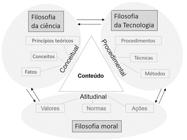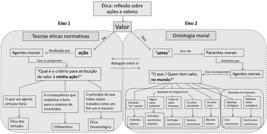ABSTRACT:
Taking as a relevant context the serious socioenvironmental problems currently faced by humanity (for example, pandemics or climate change) and the need to improve the training of subjects capable of dealing with these situations, this text is dedicated to the explicit teaching of ethics. In this sense, aiming to contribute to a didactic transposition of contents related to ethics, we have as our objective to present a reference matrix of concepts and articulated schemes, in moral philosophy, above all, but not exclusively, for science education. For this, we will offer as our main contributions: (1) a general conception of ethics, and a moderate distinction between ethics, as the domain of the contingent, on the one hand, and nature, as the domain of the necessary, on the other; (2) an analysis of the concept of value in two axes: one focused on the value of action (with the categories: deontology, utilitarianism and virtue ethics), and another dedicated to the value of beings (with categories of moral consideration or moral ontology: individualism, selective anthropocentrism, anthropocentrism, senciocentrism, biocentrism, ecocentrism and socio-ecocentrism); and, finally, (3) recommendations for teaching ethics, with an emphasis on fostering the cultivation of virtues for the expansion of moral consideration, a trend that is consistent with the project of an education for the training of virtuous agents, something which is demanded by the serious socio-environmental problems of our time. Thus, we hope that educators and researchers will be able to discuss and to apply these contributions in their daily work.
Keywords:
socio-environmental problems; moral; values; virtues; education

 Thumbnail
Thumbnail
 Thumbnail
Thumbnail
 Thumbnail
Thumbnail


